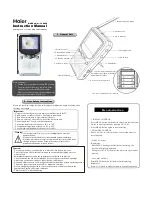
it may be attached to hidden background talkgroups, or
a folder has not been selected (Folder Selection Mode only), or
a change of network may have occurred and the last used talkgroup may
not be usable on the current network.
When your radio is powered on, if possible it re-selects either the default
talkgroup or connects to your last selected talkgroup.
Special folders
In addition to the ‘standard’ folders created to contain your talkgroups, your
radio can be customised with Special folders. Special folders can only contain
talkgroups (they cannot contain folders). Some Special folders are
continuously scanned, and when ongoing calls are detected you can join in
by pressing the PTT.
The following special folders may be programmed into your radio during
customisation:
Favourites—
frequently used talkgroups that can be added to the folder
during customisation or added by the user.
All—
contains every talkgroup programmed into your radio including
those in special folders. Only available on radios customised for Talkgroup
Selection mode.
DGNA—
contains up to 50 dynamically assigned groups. The contents are
automatically maintained by the radio and are not customisable in
Talkgroup Selection Mode. You can select a DGNA talkgroup. In Folder
Selection Mode, the scan state (scanning enabled or disabled) of a
talkgroup can be changed and the folder can be emptied using the
Folder
Restore
option.
UDSL—
user-defined scan list(s), see
. A
list of talkgroups which you can modify yourself. If you select a UDSL
instead of a specific talkgroup
your radio scans all the talkgroups in that
UDSL.
Until a UDSL is selected its talkgroups are not scanned for
activity
. For more information see
. Only
available on radios customised for Talkgroup Selection mode.
Always attached
—talkgroups which the radio scans continuously for
activity. A talkgroup in this folder can be selected as the requested
talkgroup in Talkgroup Selection Mode.
50
HTT-500-2 – 12/2016
















































